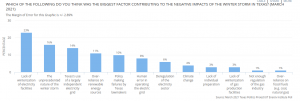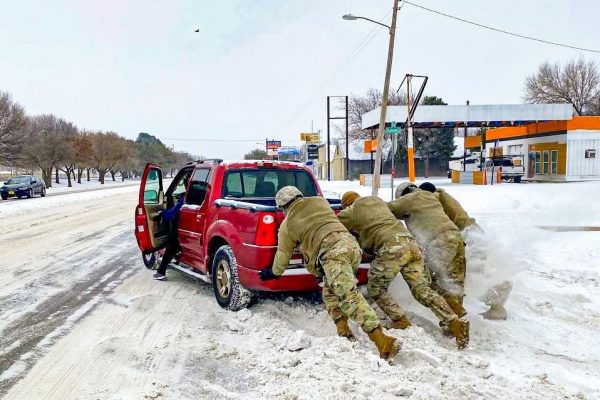AUSTIN, Texas — After an unprecedented winter storm left more than 100 dead and millions without power, Texans call for better preparation through winterization and improved energy reserves, and they support legislative proposals that require energy council board members to live in Texas, according to a new poll by The University of Texas at Austin.
When considering a number of factors that contributed to the negative impact of the February storm, large majorities of Texans cited the lack of winterization of electricity facilities (75%) and of gas facilities (64%), as well as the unprecedented nature of the storm (68%). More than half (52%) pointed to “policymaking failures by Texas lawmakers.”
The poll, led by researchers from the Texas Politics Project and the UT Energy Institute, was conducted online among 1,200 self-declared registered voters in Texas from March 19 to 26. The overall results have a margin of error of +/- 2.83 percentage points.
“Texans have a lot of ideas about what contributed to the hardships that a majority of them experienced to one degree or another,” said James Henson, executive director of the Texas Politics Project and one of the lead researchers on the poll. “The flurry of activity we see in the Texas Legislature suggests that lawmakers know their constituents were affected by the infrastructure failures that took place during and after the storm and want meaningful action.”
Looking forward, 85% of Texas voters say they support requiring energy providers to weatherize their facilities, though a smaller share, 53%, favor providing government funds to pay for weatherization. Other proposals that received substantial support included requiring that companies and regulators ensure higher levels of reserve energy to meet spikes in demand (78%), requiring all Energy Reliability Council of Texas (ERCOT) board members to reside in Texas (75%), and creating a statewide disaster alert system for impending weather-related disasters and power outages (73%).

The poll also asked Texans to reflect on their experiences during the storm and in its aftermath:
- 66% of those polled reported their electricity stopped working during the storm.
- Of those who reported electricity outages, 49% reported being without electricity for one to three days, and 28% without power between four and seven days.
- 56% reported not having reliable internet access in their home.
- 53% reported having to obtain drinking water.
- 30% reported lost income from not being able to go to work.
- 40% reported an electricity bill that was higher than normal.
It also explored Texans’ assessments of how various entities and actors handled the storm and its effects:
- 8% approved of how ERCOT handled the response to the storm, 72% disapproved.
- 12% approved of how the Public Utility Commission handled the response to the storm, 50% disapproved.
- 12% approved of how the Railroad Commission of Texas handled the response to the storm, 47% disapproved.
The state’s political leadership received mixed reviews for their handling of the storm and its effects. Gov. Greg Abbott received approving marks from 41% of Texas voters while 45% disapproved — higher than the 28% of voters who approved of how the Texas Legislature has handled the situation, with 37% disapproving. Texans gave their local government higher marks than state-level elected officials: 47% approved of local government efforts, 26% disapproved.
Full results from the poll can be found at the Texas Politics Project website, including extensive graphic resources and source documents.




